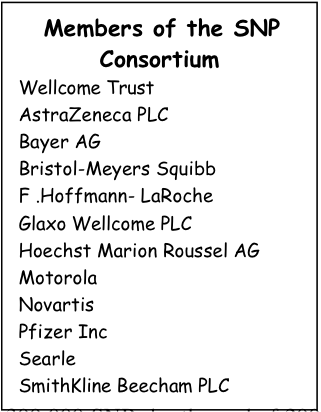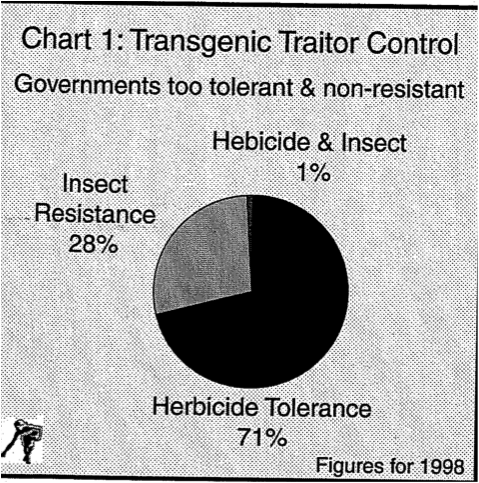With computer-assisted DNA sequencing machines running faster and more cheaply, researchers are now entering Phase II of human genome research. Companies are patenting and privatizing the commercially-important bits of variation found in individuals, indigenous peoples, disease and disability groups, and ethnically-distinct communities.
Briefings

Human Genetic Diversity Enters the Commercial Mainstream
Monsanto terminates itself. No surprises in No-Name $27 billion merger.
Monsanto announces that it will merge with Pharmacia-Upjohn and 'spin-off' its agricultural activities. The move heralds pharmaceutical industry strategy to distance itself from GM food flop. Monsanto also announced that it would drop its ill-fated bid to acquire Delta & Pine Land, the largest cotton seed company and co-owner of the prototype Terminator patent.
The Impact of Intellectual Property Rights on Sustainable Food Security and Farm Families Remains to be Felt
Examines the controversy over the intellectual property provisions of the WTO with special emphasis on the acrimonious debate underway in Africa. To date no one has been able to give a clear answer to what the benefits of the system are for poor farmers and for food security.
Update on Consolidation in the Life Industry
Corporate "Gene Giants" are expanding market share over agribusiness, food and pharmacy. Market dominance combined with monopoly patents gives the Gene Giants unprecedented control over the products and processes of life - the biological basis for commercial food, farming and health.

The Terminator's Wider Implications
RAFI examines the broader implications of Terminator and Traitor technologies. Traitor Tech refers to a new array of patents describing the control of a plant's genetic traits by the application of an external chemical catalyst. Farmers are becoming trapped in a pattern of biological controls that inevitably lead to bioserfdom.
The Novartis patents comprise a wide-ranging and inter-related group directed toward controlled expression of desired traits in plants, these resulting from introduction of DNA constructs. While a principal focus of the work is to regulate gene expression by exposure of the plant to chemicals that can activate the promoter regions of introduced genes, the work also includes constructs that confer the constitutive expression (i.e. maintained in the absence of external stimulus) of introduced traits. In addition, considerable effort has been devoted to isolating the gene products which are produced as a stress response by the plants. Isolation of the genes that code for these proteins, and of the promoter sequences which regulate their expression, provide the basis for much of the work. Several of the claims are methodological, defining ways of isolating desired genes and the promoters that control them, but essentially they are variants of themes already well-developed in biotechnology. Similarly, while there is considerable space given in the discussion to the methods of transforming the plants through introduction of DNA sequences, the approaches used are standard for the industry and not relevant to understanding the result.
RAFI's Seed Industry Consolidation Chart
The first half of 1998 witnessed a dramatic consolidation of power over plant genetics worldwide. The global seed trade is dominated by life industry giants whose vast economic power over plant germplasm has effectively marginalized the role of public sector plant breeding and research.
New Genetic Technology Aims to Prevent Farmers from Saving Seed
RAFI's first publication alerting the world to Terminator technology - published just weeks after RAFI discovered the patent. On March 3, 1998 the US Department of Agriculture and an American cotton seed company, Delta & Pine Land Co., received a US patent on a technique that genetically alters seed so that it will not germinate if re-planted a second time. It is a global threat the farmers, biodiversity and food security.
UPOV Buries it Head; PBR Moratorium Page
RAFI's study of 118 Plant Breeders' Rights claims exposes a predatory pattern of biopiracy supported by UPOV and by national legislation in several OECD countries, especially Australia.
The Life Industry 1997: The Global Enterprises that Dominate Commercial Agric., Food, and Health in 1997 - an overview
